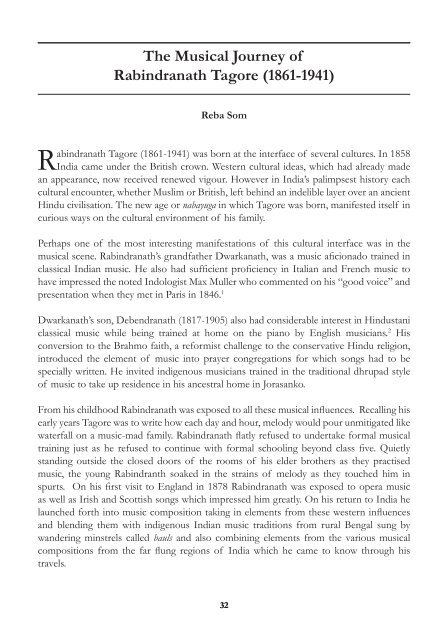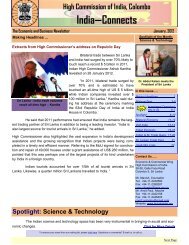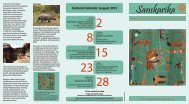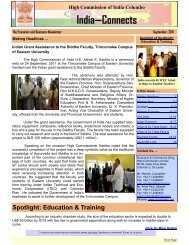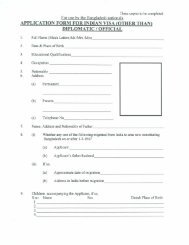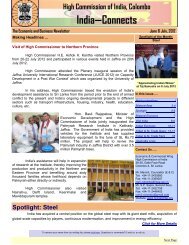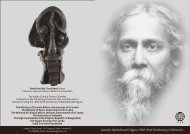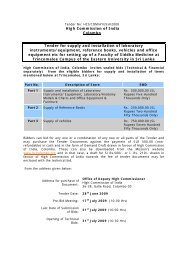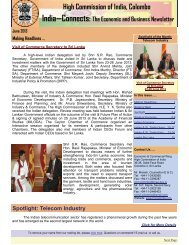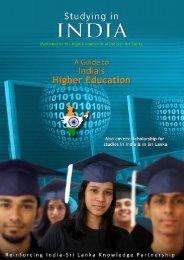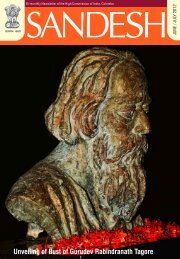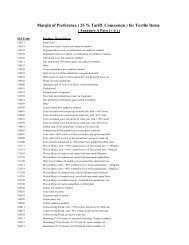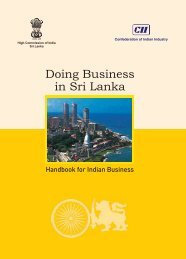Remembering Rabindranath Tagore Volume - High Commission of ...
Remembering Rabindranath Tagore Volume - High Commission of ...
Remembering Rabindranath Tagore Volume - High Commission of ...
You also want an ePaper? Increase the reach of your titles
YUMPU automatically turns print PDFs into web optimized ePapers that Google loves.
The Musical Journey <strong>of</strong><br />
<strong>Rabindranath</strong> <strong>Tagore</strong> (1861-1941)<br />
Reba Som<br />
<strong>Rabindranath</strong> <strong>Tagore</strong> (1861-1941) was born at the interface <strong>of</strong> several cultures. In 1858<br />
India came under the British crown. Western cultural ideas, which had already made<br />
an appearance, now received renewed vigour. However in India’s palimpsest history each<br />
cultural encounter, whether Muslim or British, left behind an indelible layer over an ancient<br />
Hindu civilisation. The new age or nabayuga in which <strong>Tagore</strong> was born, manifested itself in<br />
curious ways on the cultural environment <strong>of</strong> his family.<br />
Perhaps one <strong>of</strong> the most interesting manifestations <strong>of</strong> this cultural interface was in the<br />
musical scene. <strong>Rabindranath</strong>’s grandfather Dwarkanath, was a music aficionado trained in<br />
classical Indian music. He also had sufficient pr<strong>of</strong>iciency in Italian and French music to<br />
have impressed the noted Indologist Max Muller who commented on his “good voice” and<br />
presentation when they met in Paris in 1846. 1<br />
Dwarkanath’s son, Debendranath (1817-1905) also had considerable interest in Hindustani<br />
classical music while being trained at home on the piano by English musicians. 2 His<br />
conversion to the Brahmo faith, a reformist challenge to the conservative Hindu religion,<br />
introduced the element <strong>of</strong> music into prayer congregations for which songs had to be<br />
specially written. He invited indigenous musicians trained in the traditional dhrupad style<br />
<strong>of</strong> music to take up residence in his ancestral home in Jorasanko.<br />
From his childhood <strong>Rabindranath</strong> was exposed to all these musical influences. Recalling his<br />
early years <strong>Tagore</strong> was to write how each day and hour, melody would pour unmitigated like<br />
waterfall on a music-mad family. <strong>Rabindranath</strong> flatly refused to undertake formal musical<br />
training just as he refused to continue with formal schooling beyond class five. Quietly<br />
standing outside the closed doors <strong>of</strong> the rooms <strong>of</strong> his elder brothers as they practised<br />
music, the young Rabindranth soaked in the strains <strong>of</strong> melody as they touched him in<br />
spurts. On his first visit to England in 1878 <strong>Rabindranath</strong> was exposed to opera music<br />
as well as Irish and Scottish songs which impressed him greatly. On his return to India he<br />
launched forth into music composition taking in elements from these western influences<br />
and blending them with indigenous Indian music traditions from rural Bengal sung by<br />
wandering minstrels called bauls and also combining elements from the various musical<br />
compositions from the far flung regions <strong>of</strong> India which he came to know through his<br />
travels.<br />
32


